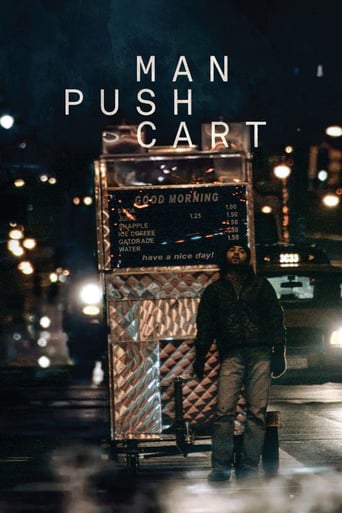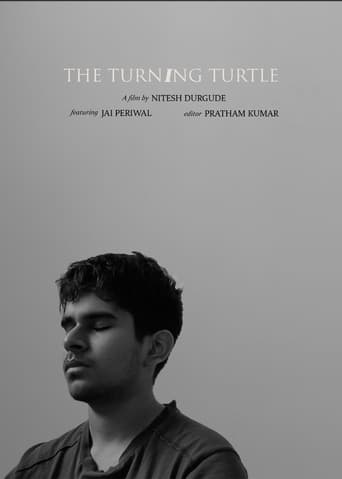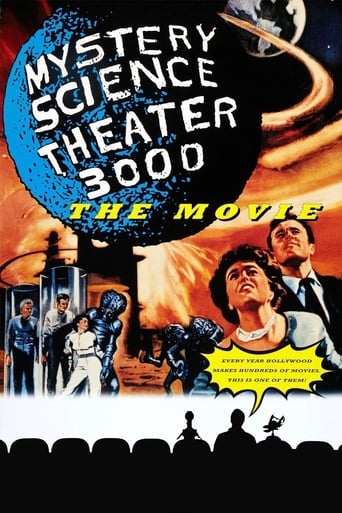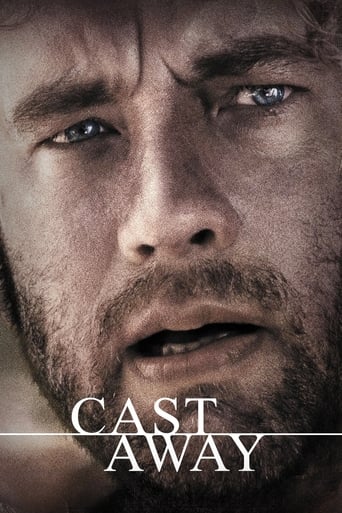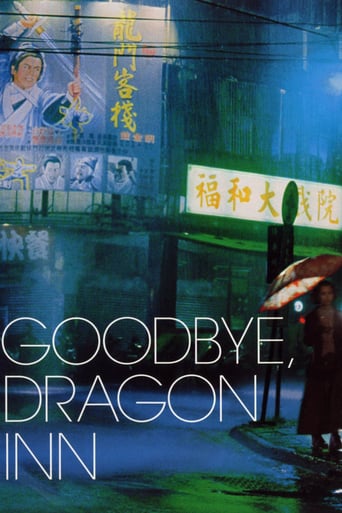
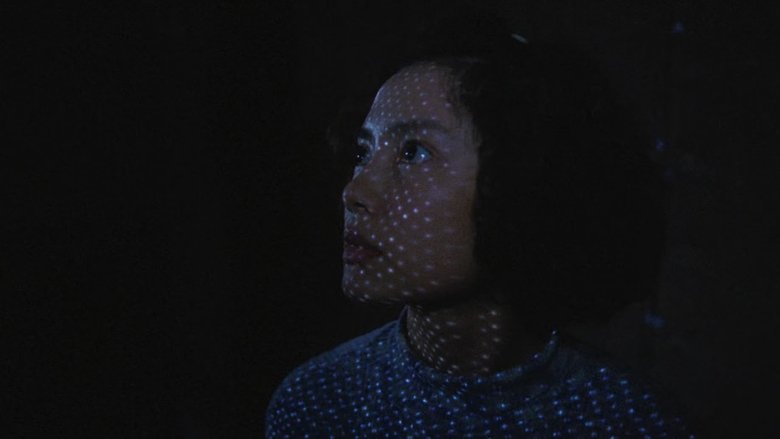
Goodbye, Dragon Inn (2003)
On a dark and rainy night, a historic and regal Taipei cinema sees its final film: 1967 martial arts feature "Dragon Inn". As the film plays, the lives of the theater's various employees and patrons intersect, and two ghostly actors arrive to mourn the passing of an era.
Watch Trailer
Cast


Similar titles
Reviews
I just watched this film in my World Cinema film class. It was very interesting I must say, but I appeared to be the only person in the class to have enjoyed it. Others said the movie was too slow, had no plot, and was boring.I understand where they're coming from, this type of film has a specific target audience. It reminded me of a couple of Gus Van Sant's films, "Elephant" and "Gerry". They were slow-paced and very quiet, nothing really went on, but i love these kinds of movies. Would I recommend watching it? Yes. Would I recommend buying it? No. It's not the type of movie you'll watch more than once or twice. It does get sort of monotonous towards the end, with the extremely long cuts that never moved.But there were some good qualities. For me, the movie was hilarious. It was definitely my kind of humor. There's the gimp girl that works at the theater who we are forced to watch walk up the stairs, limping all along the way. And then, my favorite, was the awkward Japanese boy who watched everybody in the theater. the uncomfortable situations he's put in our hilarious. We think something is going to happen each time, but nothing ever does. But still, that's why it's so hilarious. Definitely not the type of humor for everyone though. If you're the kind that gets bored easily then you'll be too frustrated to appreciate the humor, b/c chances are you'll turn the film off. There was some beautiful composition and cinematography. the different camera angles and distances are interesting for the most part. but again, this is probably something more for film students than the average viewer.So, overall I think this movie is worth a look. Depending on who you are, you may find it funny, but you may find it sad b/c of how lonely the characters are, esp. the Japanese boy and the gimp. This film will make you uncomfortable and you may squirm at times. If you like that in a film then I'd recommend this.
If you've read the other reviews, you know what you're in for. Don't worry about spoilers (none here, but don't worry about others'), because not much happens in the movie. Tsai paints his movies at the speed of Michelangelo painting a ceiling--no, he unreels them at the speed of the epic that's played this old movie house a thousand times. As in other Tsai movies, the colors are rich, and even the starkest images are carefully composed, allowing the film to convey the full depth of feelings.That's what this movie does. It doesn't tell a story, really, but conveys what it's like to walk along empty city streets on a rainy night, alone. And what it's like to be in a dying old movie palace. The community that has outgrown the old Fu Ho cinema seems to tell its patrons, its employees, and even the building itself that all of them really ought to be somewhere else. But there they are, where they need to be, for the last show.The movie's point of view is variously that of the young limping woman, the Japanese kid, and the old actors, but ultimately, Tsai tells the story from the theater's point of view, as if he interviewed it Tsai-style, pointing the camera at it and letting the theater speak at its edificial pace. You feel all that it's seen and sees, every day. It's as if the theater knows it's done for, resigned to its fate, not yet ready to die, too tired to fight.It doesn't matter that the theater is in Taipei. Anyone who had a special place for movies, especially if it's gone, will be able to see that theater in the Fu Ho. I thought of my last visits to Seattle's Coliseum, King and United Artists theaters, and how they clung to life in their final days. All of them could seat hundreds of patrons, maybe a thousand even, and I never once saw them close to filled. The King is now a megachurch, the Coliseum is a Banana Republic, and the UA is dust, with the marquee sign marking its grave. The movies that played there live on in DVDs and shoebox megaplexes, but their days of playing in grand auditoria to great audiences are largely gone. How can "Lawrence of Arabia" be "Lawrence" in a shoebox, or on any CRT or LCD screen? Norma Desmond told us about the pictures getting smaller. Tsai warns us that the last days of the big screen are here, and that the credits are rolling. Many loved the old moviehouses in their grand glory days, but in "Goodbye Dragon Inn," Tsai shows the beauty of the big theaters as their curtains slowly fall.
"Good Bye, Dragon Inn (Bu san)" is something of a Taiwanese "Cinema Paradiso" and "Last Picture Show" in its love of old movie theaters and evoking the unfulfilled longings we project onto movies and their showcases.We take refuge (and I have no idea how we were supposed to know that one of the characters we are following in is a Japanese tourist, per the IMDb plot description) during a rain storm on the last night at a huge theater, and the camera slowly leads us through every inch of the place. The vast scale of the place is brought home to us (and it will have less impact when not seen on a big screen) as virtually every inch is navigated painfully by a lame employee, clumping (as we only hear ambient sounds) up and down all those stairs, from the red velveteen seats around every nook and cranny and down long hallways and seedy passageways.I don't know if only a Western viewer thinks at first one character is a pedophile or another a transvestite, as the theater certainly looks like the old ones that were in Times Square, or if writer/director Ming-liang Tsai is toying with all of us, as he brings other assignation attempts closer (in what must be the longest time any men have ever spent leaning against a urinal), but they are as unreal as the movie-within-a-movie, the swordplay flick "Dragon Inn" which is just a bit more stilted and corny than the current "Warriors of Heaven and Earth (Tian di ying xiong)."There is one especially lovely moment, within beautiful cinematography throughout, of reaction to the flickering screen when the employee pauses in her rounds to look up at the huge image of the warrior princess and shares our view of the screen with her. Amusingly, the only fulfilled feelings are hunger, as various characters noisily eat a wide variety of refreshments. The projectionist is as much an unseen power as Herr Drosselmeier in "The Nutcracker," as we don't even see him until the theater is almost ready to close. He is as oblivious to interacting with real people as every other member of the sparse audience. The major events in the film are when two characters even acknowledge each other's existence, let alone speak the only three lines or so of spoken dialogue in the entire film, reiterating what we've seen visually -- "No one goes to the movies anymore." The closing nostalgic pop song is jarringly intrusive at first to this quiet film, but the lyrics are very appropriate.
Tsai Ming-liang's "Goodbye Dragon Inn" is a spectacularly dull movie, a limp ode to the bygone days of cinema-going. A film smitten with its own stasis, "Goodbye" culminates in a shot held for an obscene amount of time of an empty movie theater. Tsai's known for holding his shots way past the point most directors yell cut, and the result can be strikingly effective in the right context (the brilliant final shot of "Vive L'Amour") but "Goodbye" is almost an art film parody in its studied minimalism. The money shot in particular is a groan-inducer that makes you long for a fast-forward button. "Goodbye Dragon Inn" sounds like it ought to appeal: a homage to the glory days of cinema by a great director, but Tsai seems to be resting on the assumption that anything he cranks out these days is destined for acclaim (which is true). However, ever since "The Hole" Tsai's inspiration appears to be running out; what in the earlier films seems innovative comes off as mannered in the later ones. "What Time is it There?" is a good flick but hardly feels like anything new from the filmmaker, "The Skywalk is Gone" is a short-film punchline for "What Time?," and "Goodbye" is just grinding. Tsai's probably incapable of making a thoroughly awful movie and there are spots of greatness in "Goodbye Dragon Inn," but hardly enough to justify a feature-length film. You can almost feel the director yawning behind the camera as he's filming, telling his actress to just continue sitting for an interminable amount of time so he can pad it just a little more (though the movie is only 80 minutes long it feels much, much longer). The director's always threatened to deadend his limited stylistic resources and "Goodbye Dragon Inn" is the wall he's always threatened to hit. I like Tsai and think he has some worthwhile things to say, but he's said the same things over and over again and the point's been made. People these days have trouble connecting, the values of the old days have become buried under the industrial rubble of progress, yes yes. Tsai fixates on the same themes in the same way he fixates on an empty theater or a woman hobbling slowly across the screen. Since there isn't too terribly much variety thematically or stylistically in the his films, familiarity with his past work leads to a feeling of having repeatedly tread the same path. It takes a true master to be able to be as stubbornly dwell on the same ideas in the same manner over the course of a career and pull it off, and Tsai is hardly a Bresson or Ozu. Flashes of brilliance and invention are certainly to be found in Tsai's movies, but "Goodbye" just uses minimalism to mask its lack of substance. Slow movies don't have to be tedious and unrewarding, as a few Tsai Ming-liang films have demonstrated, but often the tendency among art film devotees is to equivocate slow and good. "Goodbye Dragon Inn" isn't very good. The ideas are slight, the homage curiously lacks feeling, and the whole thing just drags along way past the point of interest like Tsai's lead actress down the corridor.





